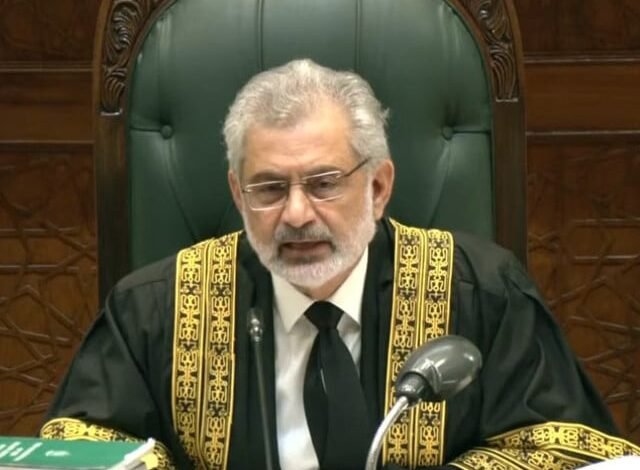
Chief Justice of Pakistan (CJP) Qazi Faez Isa maintained on Monday that transparency in the apex court has improved significantly, stating that past practices of predicting case outcomes based on the “bench composition” no longer exist.
Speaking at a full court reference marking the start of the new judicial year on Monday, CJP Isa remarked, “Previously, it was common to predict the outcome of a case just by looking at the bench”.
“Now, even I do not know which judges will sit alongside me for a case,” he continued.
In his address, the CJP outlined several reforms aimed at enhancing the judicial process, including the live broadcasting of hearings.
Broadcasting of hearings
He noted that the decision to air cases of public interest was made to provide direct access to court proceedings.
“The purpose of live transmission was to show our performance to the public. Before this, people only knew what TV channels or YouTubers reported,” he explained.
The first case broadcast live, he pointed out, was the Practice and Procedure Act, which was heard by the full court. The ruling led to a transfer of powers from the Chief Justice to a panel of three judges.
Chief Justice Isa also highlighted changes in court procedures, including the approval of the cause list.
“Previously, the Chief Justice would approve the cause list every Thursday, and had the authority to modify it”.
“That power has now been abolished, and it is now the Registrar’s responsibility to schedule cases for hearings. The cause list no longer comes to the Chief Justice,” he said.
He further mentioned that he had returned luxury vehicles provided for official use, including a bulletproof Land Cruiser stationed at the Lahore registry.
“I told the government to sell these cars and buy buses for the public instead,” Isa added.
Addressing the issue of judges’ inclinations, the chief justice noted that “every judge develops certain tendencies over time”.
“It becomes somewhat clear if a case lands with a particular judge, whether they would lean towards the prosecution or not. This happens all over the world.”
Isa also revealed that all staff members on deputation at the SC had been sent back, as no one should remain in such positions for more than three years.
“Their stay was preventing the promotion of permanent employees. With their departure, 146 Supreme Court employees have been promoted and 78 new appointments made,” he stated.
Regarding case assignment, he clarified that “it’s no longer the Chief Justice who assigns cases, but a committee. Criticize, but speak the truth and report the facts.”
CJP Isa’s year in top court
While the outgoing year showcased a harmonious relationship between the judiciary, the executive, and superior bars, it was anything but smooth sailing.
The top court’s critical role in enforcing the date of the 2024 general elections compelling key stakeholders to announce February 8 as the election day remains a feather in its cap.
However, controversies lurked around every corner.
The January 13 ruling, in which CJP Isa declared PTI’s intra-party election illegal and subsequently revoked its election symbol, cast a long shadow over the fairness of the upcoming elections.
PTI leader Imran Khan faced convictions in three separate cases before the polls, with critics pointing to the lack of due process.
The superior judiciary’s passive stance on the alleged manipulation of judicial proceedings only fed the impression that it has largely remained a silent spectator, watching from the sidelines as tensions flared.
The PTI has already knocked on the SC’s door with a petition to constitute a judicial commission to probe alleged rigging in the elections. The petition remains pending.
Moreover, despite the judiciary’s efforts, the election results did not deliver for the “powerful circles.”
PTI, now reeling from the loss of three National Assembly seats after CJP Isa’s decision to restore the ECP’s recounting orders in key constituencies, continues to cry foul, with petitions on alleged rigging still pending before the court.
On the flip side, the current government is at ease with CJP Isa. However, the looming specter of his retirement has fueled concerns within the corridors of power, with officials wary of what the future might hold once Isa exits the scene.






